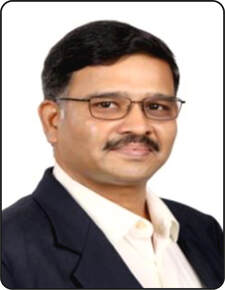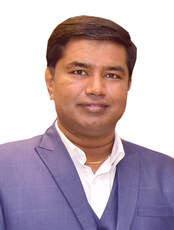|
Mr. S. Mohanraj is an astute People Management Professional with 27+ years of comprehensive & hands on Human Resources experience with proven track record of achieving Business results through effective management of People processes like Talent Acquisition, Talent Management, Performance Management, Organization capability building, Employee Relations, Talent Engagement, Learning and Development, Innovative HR Practices, Change Management, Organization development, statutory & Administration. He engaged in Industrial relations environment engaging Unionized workmen – successfully signed 6 settlements & introduced automation in the process. He provided overall HR Leadership in multi-divisional, multi-location, organizations. Managed strategic and operational HR at corporate level with ability to deal with complex issues and managed different industry environments like Pharmaceutical, Biotechnology, Food, Engineering, composites (Defence & Aerospace), Printing Technologies & Media & currently with Apparel manufacturing organization. Mr. S. Mohanraj holds a Master of Social Work degree from Sacred Heart College, Bosco Institute of Social Work, Madras University and Bachelor of Arts degree from St. Joseph's College, Bangalore University. He is the industry representative for Industrial Relations on the Board of studies at St. Joseph's Art's & Science college- Bangalore and the Member of ER/IR Think Tank – Karnataka Employers Association. Since March 2019, He is working in Silver Spark Apparels Ltd (Raymond Ltd), a leading diversified group with interests in Textiles & Apparel sectors as well as presence across diverse segments such as Real Estate, FMCG, Engineering in national and international markets. Heading their Apparel manufacturing vertical HR in India & overseas, engaging close to 10,000 employees with 5 manufacturing units, as Director – Human Relations, reporting to CHRO of Lifestyle Business & he is accountable for all HR deliverable for the Business vertical with Matrix reporting structure. 1. What's your story? I am from a humble middle-class family background. Father was working in the Indian Army, the mother being a non-matriculate, taking care of 3 children independently, while the dad was posted out in the Northeastern States. Hence, spouses of defense personnel are largely self-made and are extremely strong at life lessons. Due to the above circumstances, my social connections and dealing with people independently started at a young age. After my 10th Std from CBSE board at K V M E G & Centre and post taking admission for 11th at K V A S C & Centre, on the day of admission to Humanities/Arts, I did not know what this course meant, I understood it to be some drawing related. However, I walked up to the admission Head Clerk and sought clarification and expressed my understanding, and was affectionately told what it actually meant and what subjects I would be studying, etc., I stood in the reception area and deeply introspected on the situation I was in and realized that I need to open up and seek in life and that was the last stop and never looking back. I decided every step of my career thereafter and now I am where I have steered a successful and momentous HR career spanning 27+ years. I have been helping and coaching people, as initial student life is crucial and the right career guidance is important to avoid a mid-career crisis. I have gone through the HR profession's grinds and learned largely through Experiential Learning with my Bosses. Reading has helped me to be contemporary in the function that I lead. 2. Union leaders are stronger than current many IR professionals! Your comments… I do not ascribe to this statement. Perhaps, some exceptions could be there. The rationale for this statement is that IR professionals while choosing the profession are fully aware of the requirements to adore this role and the occupational challenges associated with the role, stakeholders, etc., In the situation that the individual does not measure up to this requirement, the challenge is imminent. One needs to understand union leaders are stronger from what perspective? Moreover, IR professionals are not stronger from what perspective? this will help us to respond more appropriately. 3. What do you think are the biggest challenges ahead for the next generation of IR leaders? Next-generation IR leaders need to make themselves relevant to the business, the Union Leaders internal and external should have an effective engagement process, which enables them to understand their purpose and actions, inaction, and incorrect actions influencing all stakeholders. Further, IR leaders need to have hands-on experience in HR interventions, proactive HR enables preventive IR situations. Periodic business reviews, making union inclusive to organization building, trust, mutual respect, listening to them, and at the same time being affirmative and making them see the larger picture and purpose will go a long way in having a harmonious IR/ER climate. IR leaders need to understand the changing landscape of IR beyond manufacturing and into IT/ITES/BPO etc. Further, IR leaders need to be hands-on with the statutory provisions, be contemporary with the subject, be a good reader, be a good teacher as much as a student, have foresight and hindsight, and understanding of people, business, work environments both internal and external, genuine concern for people, ensure basic requirement and compliances are adhered will go a long way to address challenges. Importantly, IR is a dynamic subject, wherein one needs to be constantly reinventing oneself to raise up to the occasion. 4. In the next few years, the industry will face a huge shortage of competent IR professionals. Who is responsible for this and how can we avoid this crisis? The shortage of competent IR professionals is an outcome of demand vs supply, the interest of the students willing to pursue this vertical of HR, Institutions offering such courses, quality of such course offerings, capability building of IR professionals, industry-academia partnerships, etc., The responsibility bestows on the students, institutions, and industry at large who are stakeholders in this process. If we need to effectively ensure employability, these stakeholders have to work in tandem. The ecosystem needs to create the aspiration to get into this role and its influence on the organization and business continuity, which ultimately influences all stakeholders. We can address this challenge through a couple of key measures like Institutions offering concurrent field works in an industry setting as part of the course curriculum. 5. What are your tips for creating a strong professional rapport between HR and union leaders?
6. What makes up a brand? A personal brand statement is a sentence that explain what you do and why you are unique in your field. This is the most important subject of treasure on and talk to my teams across my organization. Like any Brand takes prominence only post possessing certain qualities, features, value, USP etc. Every individual is a brand in himself/herself. However, how one wants oneself to be perceived is the outcome of the inputs to evolve as a brand? It holds good for the team, the department/function, organization, country etc., our uniqueness of being a brand is very formidable and is our asset and it grows, lives, and leaves us in our timelines. 7. How would you describe your leadership style? My leadership style is being alongside my team and leading them. Walking the talk. Enabling the team to perform and stand by them. I do demonstrate situational leadership as well. Recognize the team for their delivery. Be open for feedback as much as possible, give feedback to the team as and when required which will enable them to correct and perform better. 8. What are the most important things you learned from your father? My father is my hero alike to many children. He is being an ex-serviceman; I have grown in the environment of army life and being a Kendriya Vidyala Student had similar environment being amongst defense personnel kids. My father has imbibed in me the following principles and Values:
9. What makes you motivated in HR? HR is one of the Key functions of an organization, which deals with Human Resources, which is embodiment of Possibilities and Potential. HR is accountable to enable them in achieving organization's purpose and delivering its objectives through other factors of organization performance. I have chosen this course by wish since I took up this course during my graduation from St. Joseph's Arts & Science, Bangalore, and later MSW from Madras University. I am, privileged to be on the Board of Studies for Industrial Relations at St. Joseph's University (My Alma Matter) for the past 15+ years. I feel motivated because this function gives me the opportunity to touch lives of employees and their family in the journey of achieving organization vision and mission. Further, it continuously challenges stakeholders in the organization. 10. Name the top 3 labor laws that all HR professionals must know. Factories Act 1948, Industrial Disputes Act 1947, Trade Unions Act 1926. Going forward all 4 codes will assume importance. 11. What are the most important things you have learned from your bosses? What I learned is that "When you start changing yourself, everything will change for you" - always start from the inside. For anything to change for you, you have to change from the inside. Spend organization money as though you would have spent from your pocket. Continuously Learn. Learners are leaders and leaders are learners. Appreciate in Public and reprimand in Private. Walk the talk. Uphold honesty and integrity in everything you do. Be a role model. Be a brand. Speak up for self and your stakeholders without fear. Ensure fairness in action. Be self- motivated and be pro-active in your actions. 12. How does Business Intelligence (BI) apply to HR? What is the impact of BI on HR? The purpose of HR function is to enable Human Resource of the organization to deliver business results thereby achieving stakeholder deliverables. Hence, HR needs to be at the forefront to understand business, customers, market, stakeholders, and all related Business Intelligence. This will influence the HR action plans and course correct to be relevant to the business requirement and market requirements. Further, will aide in the L&D and Talent Management function besides effectively delivering other roles including IR
0 Comments
Leave a Reply. |
ArchivesCategories
All
|
||||||
SITE MAP
SiteTRAININGJOB |
HR SERVICESOTHER SERVICESnIRATHANKA CITIZENS CONNECT |
NIRATHANKAPOSHOUR OTHER WEBSITESSubscribe |
MHR LEARNING ACADEMY
50,000 HR AND SOCIAL WORK PROFESSIONALS ARE CONNECTED THROUGH OUR NIRATHANKA HR GROUPS.
YOU CAN ALSO JOIN AND PARTICIPATE IN OUR GROUP DISCUSSIONS.
YOU CAN ALSO JOIN AND PARTICIPATE IN OUR GROUP DISCUSSIONS.
|
|



 RSS Feed
RSS Feed





